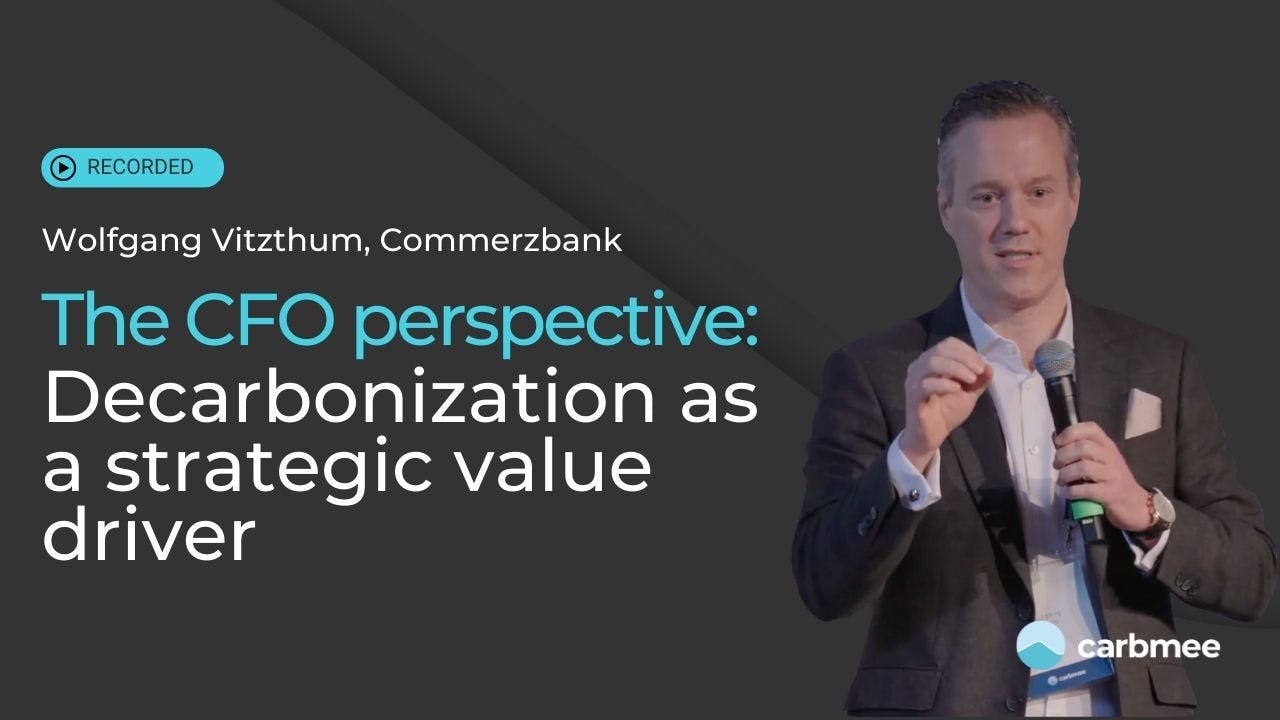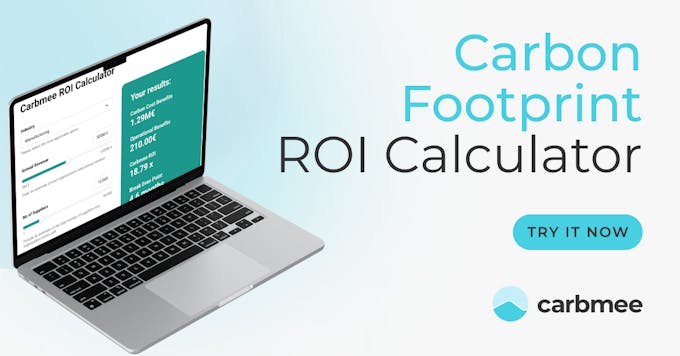Executive Summary
The Global Decarbonization Forum 2025, held on February 6th in Berlin, brought together industry leaders, policymakers, and sustainability experts to discuss and strategize on effective carbon management.
Set out to be an annual gathering, we at carbmee host the event emphasize the transition from carbon reporting to tangible reduction efforts, highlighting the integration of financial perspectives, policy navigation, and technological innovation in achieving decarbonization goals.
Missed the event? Find a brief summary of the key take-aways and top themes in this article.
Key Takeaways: How Companies Can Succeed in 2025
- Leverage Carbon as a Business Asset: Companies should view carbon reduction as an opportunity rather than just a compliance requirement. By treating emissions as a financial metric, businesses can optimize cost structures, enhance investment appeal, and strengthen their competitive positioning.
- Embed Sustainability in Financial Strategy: Integrate carbon metrics into financial KPIs to align sustainability with growth. Businesses that incorporate sustainability into their financial planning will have improved access to investment, better risk management, and stronger market positioning.
- Proactively Address Regulatory Compliance: With regulations like CBAM and CSRD reshaping corporate responsibility, companies need to implement standardized reporting and carbon management strategies. Being proactive in compliance will mitigate risks and enhance global competitiveness.
- Tackle Scope 3 Emissions Head-On: Supply chain emissions account for a significant share of corporate carbon footprints. Organizations must develop structured approaches to monitor, manage, and reduce Scope 3 emissions through supplier collaboration and improved data accuracy.
- Invest in Technology for Decarbonization: Companies should adopt AI-driven carbon tracking, footprinting, and scenario modeling tools to automate and optimize decarbonization efforts. Leveraging digital solutions enhances efficiency, reporting accuracy, and strategic decision-making.
Book a demo with us today to see how our solutions can help your company take the next step toward a low-carbon future.
- Foster Cross-Functional Collaboration: Successful decarbonization requires active engagement from procurement, finance, legal, and R&D teams. Companies must break down silos, align objectives across departments, and encourage collaboration to drive sustainability forward.
- Leverage AI and Innovation: AI and machine learning are revolutionizing the way businesses measure, manage, and reduce their carbon footprints. Companies that embrace AI-driven solutions can gain deeper insights into emissions data, identify reduction opportunities faster, and streamline reporting processes. Advanced analytics and automation enable more accurate forecasting and scenario planning, allowing businesses to make informed decisions that drive sustainability and cost efficiency.
Want to explore how AI can transform your carbon management strategy? Book a demo with us today!
Carbon Management as a CEO and CFO Priority: As highlighted in the sessions "A CEO’s View" and "A Capital Markets Lens," carbon management is no longer just an operational concern—it is a strategic imperative. CEOs and CFOs must take the lead in embedding sustainability into corporate decision-making, as investors and stakeholders increasingly evaluate businesses based on their carbon performance. Companies that fail to adapt to the evolving decarbonization landscape risk financial penalties, reputational damage, and lost market opportunities. To thrive in 2025 and beyond, organizations must integrate carbon intelligence into financial planning, align business strategies with sustainability goals, and position themselves as leaders in the transition to a low-carbon economy.
Watch Keynote: The CFO Perspective: Decarbonization as a Strategic Value Driver
In this session, Wolfgang Vitzthum from Commerzbank explores decarbonization from a capital markets perspective, highlighting its role as a strategic value driver for CFOs. The session addresses key challenges and opportunities in sustainable finance, discussing the evolving ESG landscape, regulatory pressures, and the financial implications of climate risk management.
From Carbon Reporting to Actionable Reduction
The forum opened with a strong message about the urgency of moving beyond carbon reporting and toward tangible emission reduction strategies. Carbmee CEO Christian Heinrich emphasized that while regulatory compliance is crucial, businesses should focus on integrating carbon management into core financial and operational strategies. Discussions highlighted the shift from compliance-driven efforts to value-driven carbon reduction initiatives, positioning sustainability as a catalyst for business innovation and resilience.
Financial and Procurement Strategies for Decarbonization
A recurring theme throughout the forum was the intersection of financial strategy and decarbonization. Experts from leading financial institutions and procurement firms underscored how embedding carbon metrics into financial reporting and procurement strategies can drive meaningful climate action. CFOs are increasingly incorporating carbon considerations into investment decisions, while procurement teams are leveraging carbon-conscious supplier selection to reduce Scope 3 emissions. The integration of sustainability within financial operations ensures businesses remain competitive while complying with evolving regulatory frameworks.
The Role of Technology and Cross-Functional Collaboration
Technology was identified as a major enabler in the decarbonization journey. Digital solutions, AI-powered analytics, and automated carbon footprinting tools are playing an instrumental role in helping businesses track emissions accurately and optimize reduction pathways. Panel discussions also highlighted the necessity of collaboration across various business functions—procurement, finance, legal, and research & development—to ensure a comprehensive and scalable decarbonization strategy. Companies that successfully integrate carbon intelligence into their operational framework stand to gain a significant advantage in efficiency and sustainability reporting. Want to see how technology can streamline your carbon management? Book a demo with us and explore our innovative solutions.
Case Studies and Roadmaps for Decarbonization Success
Several organizations shared their decarbonization roadmaps, detailing achievements, lessons learned, and strategic pathways for emission reduction. Case studies from industry leaders illustrated how companies are successfully linking cost savings with sustainability efforts and how they are preparing for future regulatory changes such as CBAM. Insights from businesses that have successfully aligned their financial goals with sustainability metrics provided attendees with actionable steps for improving their own carbon management practices.
Missed the session? Download the session recordings to gain valuable insights from industry leaders.
Building a Sustainable Future through Business Transformation
The forum concluded with an in-depth discussion on sustainable business transformation, emphasizing the long-term benefits of proactive decarbonization. Companies that embed sustainability at the core of their business models are better equipped to navigate regulatory landscapes, attract investment, and gain a competitive advantage. The discussion also reinforced that sustainability is no longer a niche consideration but a fundamental aspect of modern business strategy. Organizations that take early action in decarbonization efforts will be the ones leading the way toward a net-zero future.
The Global Decarbonization Forum 2025 served as a pivotal platform for sharing knowledge, fostering collaboration, and inspiring actionable strategies in the global effort to combat climate change.
On the road to 2026
We extend our gratitude to our partners, including Jaggaer and Keelvar, for their invaluable contributions to the forum. Their expertise and support played a critical role in shaping meaningful discussions and insights.
We also want to thank all our speakers and attendees for making this event a success. Your engagement and commitment to sustainability are driving the transformation toward a greener future.
See you in 2026!
Interested in accelerating your company’s decarbonization journey? Book a demo with us and take the first step toward measurable carbon reductions.
![[object Object]](https://images.prismic.io/carbmee/Z9qrYDiBA97GipUS_Title-1-.png?auto=format,compress)



